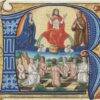Tag: “Christian
The Eschatological Nature of Christian Theology
There is no reason to absolutize any period of theological history, per se. In other words, every season of theological development, within the Church’s history, is open for engagement. The Lord Himself said He would build His Church, and through Paul continued to say that He would, in particular, provide pastors and teachers, so on and so forth. This ought to teach us that Christ has been present, all along, in His Church. He hasn’t abandoned it or left it as orphans, but has provided His Holy Spirit to presence Himself and sacra doctrina among those who fellowship with Him…
Nala’s Salvation: Against Her “Christian” Legalistic Critics
Legalism continues to be rife on the theological interwebs. An OnlyFans porn star (at the top of the “game”) just gave her life to Christ (she grew up as a Baptist pastor’s kid, like me). I watched her whole interview, where she shared her life story and testimony, on the Michael Knowles show (2:20 minutes). She has gotten lots of pushback and skepticism, particularly on the website formerly known as Twitter. There is a high profile (on said website) Jewess who has been saying vile things about this former star. But she’s a Jewess and not a Christian; so, definitionally…
The Christian Humanists versus the Scholastic Theologians: The Bible versus the Philosophers
Charles Partee in his book Calvin and Classical Philosophy, by way of introduction, offers a nice treatment on the entailments of a mediaeval Christian Humanism versus a theological Scholasticism, as both of those were present in the early formation of the Protestant Reformation; with, of course, particular reference to John Calvin. I am going to share a long passage from Partee because it is rather pertinent to the way I see myself operating; as far as both mood and method goes. I will provide the passage, and then offer up some closing thoughts (the usual). In the sixteenth century, however,…
St. Martin Luther, the Christian Humanist Against the Glory Theologians
Definitions are important; if for no other reason but to understand what something means. Context provides meaning, and thus definition, for words; whether that is in sentences, paragraphs, chapters, books, so on and so forth. When attempting to understand where a particular theologian lies, as far as classification, within the alternative types of being a theologian, it is important that we get a handle on the definitions used to ascertain that. In the medieval period, generally, a theologian could be classified as a scholastic theologian, or a Christian humanist; or potentially, both, depending on the way someone enters into the…
A Rejoinder to Christian Nationalism[s] via Appeal to a radical Reformation
If you’re on X, the site formerly known as Twitter—Christian theological X, in particular—you will more than likely be exposed to a certain mode of so-called Christian Nationalism. This mode is of a modern postmillennial variety of the theonomic type. Without getting into the nuts-and-bolds of said framework, it essentially believes that the Great Commission entails the Christianizing of the entire world; in other words, the establishment of a Christendom. Some might look at a post-Constantinian world as what a Christendom involves. So, that is one take on a theological Christian Nationalism, which is seeing some legs under it these…
On Christian Dogmatics versus evangelical-Reformed Apologetical Theology
… dogmatics offers a means of producing a portrait of the economy of grace, and of humankind and its activities in that economy, free from anxieties about foundations and therefore at liberty to devote itself to the descriptive task with Christian alertness, charity and joy.[1] Christian Dogmatics — the church’s orderly understanding of scripture and articulation of doctrine in the light of Christ and their coherence in him.[2] If the Church is going to do Church theology, what both Webster and Torrance, respectively, are signaling above, is of the upmost importance to grasp. When Christians do theology, by definition, we aren’t…
The Givenness of Christian Theology is Lively Rather than Dead[ly]
I think it always remains important, especially for those who are more “intellectually” predisposed, to remember that an application of that can never be an end in itself; everything, until the eschaton, is instrumental. That is to say, Christian doctrine, because of the dynamism and organicism of its reality in Jesus Christ and the triune God, should never became a calcified given and received. It is, indeed, both, that is, ‘given and received,’ but only as an organic lively reality wherein the receivers take what they’ve been given, speak with the Lord about it, fellowship with the communion of the…
Christian Theology Done by the Sufferers
Theology done by people in the depths of suffering looks much different than theology done by people who are relatively comfortable. When I say “theology” I mean anything anyone thinks or does towards the magnification of Jesus Christ. And this might not even be a conscious effort, especially for those in the thralls of suffering. Indeed, it is in these seasons, when “we have the sentence of death on us so that we will learn to trust the One who raises the dead,” that we are simply living out of the depths of Christ’s life for us (ecstatic existence);…
How the Inscrutable unReality of Darkness Keeps Barth and the Athanasian Reformed from Incoherence and a Dogmatic Christian Universalism
I want to talk about God’s shadow side. The rip against Thomas Torrance, Karl Barth and the Athanasian Reformed is that their respective doctrine of election leads to some form of Christian universalism (some are okay with that). But in fact, it doesn’t. People like Keven Vanhoozer, Robert Letham, Roger Olson et al. have critiqued Torrance, Barth, and Evangelical Calvinists, like myself, with reference to what they take to be our theological Achilles heel. Because they think from within an Aristotelian or Stoic theory of causation in a God-world relation, they cannot imagine how the Evangelical Calvinist, after Barth, Torrance…
The Christian God is without Proof
“The secret things belong to the Lord our God, but the things revealed belong to us and to our sons forever, that we may observe all the words of this law. -Deuteronomy 29:29 No one has seen God at any time; the only begotten God who is in the bosom of the Father, He has explained Him. -John 1:18 For I would have you know, brethren, that the gospel which was preached by me is not according to man. 12 For I neither received it from man, nor was I taught it, but I received it through a revelation of Jesus Christ. -Galatians 1:11-12 16 For we did not follow cleverly devised tales when we made known…




![A Rejoinder to Christian Nationalism[s] via Appeal to a radical Reformation](http://protestantbeliefs.com/wp-content/uploads/2023/12/anabaptistdrowning-100x100.png)

![The Givenness of Christian Theology is Lively Rather than Dead[ly]](http://protestantbeliefs.com/wp-content/uploads/2023/06/martinchemnitz-100x100.jpg)


